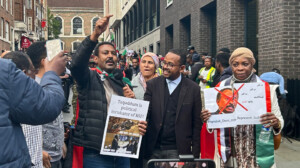June 3 Khartoum massacre: Five people still unaccounted for
Five people who ‘disappeared’ or ‘went missing’ following the violent dismantling of the sit-in in front of the army command in Khartoum on June 3, are still unaccounted for, according the Sudanese Professionals Association (SPA).
 Protest march demanding justice for slain demonstrators in Khartoum (RD correspondent)
Protest march demanding justice for slain demonstrators in Khartoum (RD correspondent)
Five people who ‘disappeared’ or ‘went missing’ following the violent dismantling of the sit-in in front of the army command in Khartoum on June 3, are still unaccounted for, according the Sudanese Professionals Association (SPA).
At a press conference on Monday, Mohamed Naji El Asam, a prominent leader of the SPA said that the whereabouts of five people listed as ‘missing’ remain unknown. He confirmed that the bodies of five victims have been identified, and 10 missing persons have been found alive, “however many are suffering from physical injuries and mental disorders”.
El Asam further confirmed that the total number of the missing is greater than what has been reported, as some families have not reported their missing relatives yet.
Following the violent dismantling of the sit-in in front of the army command in Khartoum on June 3, popularly known as the 29 Ramadan massacre, which left more than 100 people dead and hundreds more wounded, the SPA Initiative for Missing People reported it documented more than 100 cases of people who went missing.
The SPA leader assured that “the SPA will continue to follow up with the commission formed to investigate missing persons cases”.
He called for dismantling of the associations and unions that were affiliated with the defunct regime. “There must be a formation of administrative committees in preparation for trade union elections,” he said. Also, he expressed his support for the legal reform regarding the dismantling the deep state.
The SPA has finished drafting the union regulations, and plans to publish them next week for consultations.
El Asam further strongly condemned the Arab unions that declared their solidarity with the associations affiliated with the former regime.
He described their positions as “flawed” and asked them to reconsider their move. “They do not know the real truth about these unions; these authoritarian entities that implement the programs and ideology of the former regime that hijacked the function of the SPA for 30 years,” he said.
Radio Dabanga’s editorial independence means that we can continue to provide factual updates about political developments to Sudanese and international actors, educate people about how to avoid outbreaks of infectious diseases, and provide a window to the world for those in all corners of Sudan. Support Radio Dabanga for as little as €2.50, the equivalent of a cup of coffee.












 and then
and then